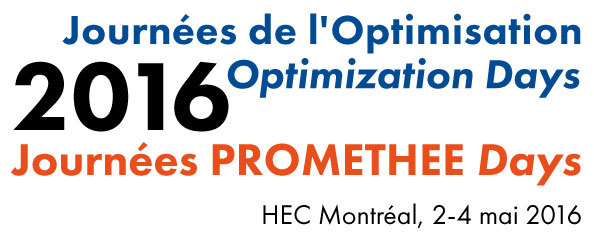
Journées de l'optimisation 2016
HEC Montréal, Québec, Canada, 2 — 4 mai 2016

TA10 Vehicle Routing III
3 mai 2016 10h30 – 12h10
Salle: TD Assurance Meloche Monnex
Présidée par Anna Franceschetti
4 présentations
-
 10h30 - 10h55
10h30 - 10h55A two-phase Pareto local search heuristic for the bi-objective pollution-routing problem
The bi-objective Pollution-Routing Problem deals with two conflicting objectives: CO2 emissions and labor costs. We propose a Two-Phase Pareto Local Search algorithm for generating a set of efficient solutions. Computational experiments show that the proposed procedure leads to better results when compared to those obtained by state-of-art multi-objective techniques.
-
 10h55 - 11h20
10h55 - 11h20ALNS to solve the snow plowing problem
We present the snow plowing problem as a Min-Max k-rural postmen problem with specific constraints. Then we explain how we process data from a GIS to an analytical network. Finally we detail the ALNS metaheuristic that we developed to tackle the problem and we show some results.
-
 11h20 - 11h45
11h20 - 11h45An exact algorithm for the departure times and speed optimization problem
In this work we provide an efficient algorithm for solving the Departure Times and Speed Optimization Problem, that is, the problem of optimizing the departure times and travel speeds of a single vehicle visiting and serving a finite number of customer’s locations in a fixed sequence. We consider the present of traffic congestion limiting the vehicle speed during peak hours. The objective is to minimize the sum of labor and CO2e emissions costs, while satisfying hard time
windows at the customer locations. We also provide insights on the impact of the driver wage policy and time windows on labor and emission costs. -
 11h45 - 12h10
11h45 - 12h10New recourse policies for the vehicle routing problem with stochastic demands
In the Vehicle Routing Problem with Stochastic Demands under the classical recourse policy, one executes the route until it fails due to an excessive demand, and then prescribes back-forth trips to recover routing feasibility. This policy entails costly trips to depot and consequently split deliveries. In this talk, we present new static recourse policies that prescribe preventive returns based on several operational criteria.
